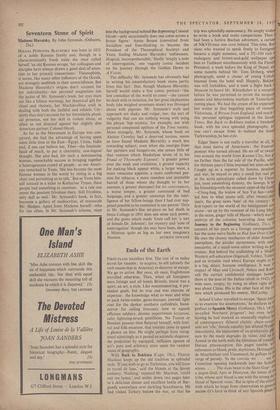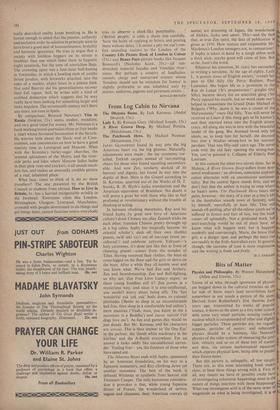Ends of the Earth .
FIRST-CLASS travellers first. The rest of us today travel for reasons : to acquire, to sell (already the verb means that in America), to discover or escape. We go to arrive. But once, ah once, Englishmen travelled otherwise. Then, when all foreigners were foreign and all hotels Bristols, travel was a sport, an art, a style. Like mountaineering, it pre- tended goals, but its true end was exercise of expertise : the knowledge what to wear and what to pack (wine-cooler, game-hamper, journal, light coat for the danker southern cathedrals, hand- mirror for ceiling frescoes); how to squash officious soldiery, dismiss importunate lazzaroni, calm lightning-struck postillions. No Tuscan or Bosnian peasant then flattered himself, with festi- val and folk-museum, that tourists came to spend a glance on him. He might perhaps have recog- nised admiringly as it passed an autotelic elegance: the projection by equipped, sufficient egoism of art's pure and arbitrary aims upon the random waste of geography.
With Back to Bokhara (Cape, 18s.), Fitzroy Maclean keeps up the old tradition in splendid style. 'If you wish to go to Turkestan, you will have to travel de luxe,' said the blonde at the Soviet embassy. 'Nothing,' rejoined Mr. Maclean, 'could suit me better,' and settles down two pages later to a delicious dinner and excellent bottle of Bur- gundy somewhere over darkling Scandinavia. He had visited Tartary before the war, so that his trip was splendidly unnecessary. He simply wishe. to write a book and make comparisons. Then had been a furtive Buchan adventure, a carloa of NKVD-men one verst behind. This time, Rus sians who wanted to speak freely to foreign became a slight nuisance, and a TU-104 rich mahogany and brown-and-gold wallpaper spy him to Tashkent simultaneously with the Finn President, a week before the King of Nepal, an some months behind Mr. Tom Driberg, wh photograph, amid a cluster of young Uzbck beamed from the hotel wall. Happily, Bokhat was still forbidden, and it took a flight back Moscow to beard Mr. Khrushchev at a receptio before he was permitted to revisit the turquoi domes and labyrinthine markets of Tamerlainc resting-place. We had the cream of his experien‘ last winter in that beguiling piece of romant Victoriana, A Person from England, and much this personal epilogue appeared in the Sandi. Times. But Back to Bokhara makes a handso book, with his own splendid photographs; you can't escape from it—behind the bree Turkmanship,he has style.
Edgar Snow is not really a traveller, at all, 10 that most native of Americans : the frustra pioneer who turned abroad. He set off at twen two around the world from Kansas City, but 8 no farther than the far side of the Pacific, whe for thirteen years China imposed her aims on hi Caught up as a reporter by famine, pestilet and war, he stayed to play a small but real pa in the acrid apocalypse called down by Chin last, most astonishing dynasty, the Soongs. It v his friendship with the recusant sister of the fall —Ching-ling, the widow of Sun Yat Sen—whi led him to what seems still, after twenty-thl years, the great news 'beat' of the century : I first report to the world of the beleaguered co mune—set up by the remnant of the Long Mat in the eaten, ginger hills of Shensi—which was 0 embryo of the colossus bestriding Asia toda. Journey to the Beginning (Gollancz, 21s.), 11 account of his years as a foreign correspondell has the same naïve faults as Red Star Over Chin,' He uses the clumsy mechanics of older Americas; journalism, the jocular earnestness, with maul' anecdotes, of a small-town editor writing to gel( cronies. But behind the scaffolding of a Midd Western self-education (Ingersoll, Veblen, Tolstoi and an irritable void where Europe ought to 171 is a big, direct, humane intelligence. It won I respect of Mao and Litvinoff, Nehru and Ron' velt (he carried confidential messages betwe0 them at the time of the Indian revolt in 1942), al wins ours, simply, by being so often right as was about China. His is the other face of the d ture which produced his enemy, McCarthy.
Arland Ussher travelled to escape. 'Spain fore us to examine the assumptions,' he declares in 1111 preface to Spanish Mercy (Gollancz, 18s.), 'of 01/ so-called Northern progress'; but even befog leaving he had stocked an unusually explicit b' of contemporary illiberal cliches: chain-restall ants are 'vile,' female equality has diluted West masculinity, the enjoyment of an aristocratic p sure by the many degrades its value, and so 0 Armed to the teeth with the literature of roman! Iberian preconception (his pages tumble wit) references to blood, pride, mysticism, Hemi ngva de Montherlant and Unamuno), he gallops to II verge of parody. 'In the corrida, we . . . see I Conscious opening backwards into the Sube° scious. . . . The slain beast is the Slain God_b a pagan God, Apis or Dionysus, the totem of t tribe, whose spilt blood is one with the strong dar blood of Spanish veins.' But in spite of the celell with which he leaps from observation to gene isation (it's hard to think of any Spanish place
is
a
really describes) reality keeps breaking in. He is honest enough to admit that the passion, authority and exclusive order he admires in principle seem to have bred a good deal of humourlessness, brutality and hermetic ignorance. He tries to argue that a society with limbless beggars on its streets is healthier than one which hides them in hygienic (ugh) sanatoria, but the tone of conviction flags. The crowning upset was a four-hour bull-baiting in Tordesillas, in which a howling mob of youths thrust javelins, with fireworks attached, into the sides of a muddy, abject beast in a potato field. Not until Biarritz did his generalisations recover their full vigour. Still, he writes with a kind of crabbed distinction which suggests that he may really have been looking for something larger and more hopeless. The seventeenth century isn't there any more, not even in Spain.
By comparison, Bernard Newman's Visa to Russia (Jenkins, 21s.) seems modest, mundane, and very good value for money. Mr. Newman is a hard-working travel-journalist (three or four books a year) whose favoured locomotion is the bicycle. He worries little about the Slavic soul or Corn- munism, and concentrates on how to have a good touristy time in Leningrad and Moscow. What with the Kremlin's barley-sugar churches, the oriental splendours of the Metro, and the river- side parks and lidos where Moscow ladies bathe in their pink vests and knickers, it all sounds excel- lent fun, and makes an unusually credible picture of a real, inhabited place.
What face, come to think of it, do we show travellers? The one presented by the British Council to students from abroad, How to Live in Britain, Is., has a harried recognisable wrinkle in the forehead. 'Enormous cities like London, Birmingham, Glasgow, Liverpool, Manchester, crowded with people determined to do things and get things done, cannot function unless everybody tries to observe a clock-like punctuality. . . ('British people,' it adds a shade less candidly, 'have the habit of replying to letters and posting them without delay.') It seems a pity we can't con- fine intending visitors to the London of the Country Life Picture Book of London in Colour (25s.) and Beaux Pays picture books like Jacques Boussard's (Nicholas Kaye, 35s.)—all sun- drenched imperial façades and Venetian river- vistas. But perhaps a country of landladies, consuls, clergy and unmarried women whose `freedom should not be mistaken for licence' is slightly preferable to one inhabited only by statues, uniforms, pigeons and pavement-artists.
RONALD nRYDEN











































 Previous page
Previous page